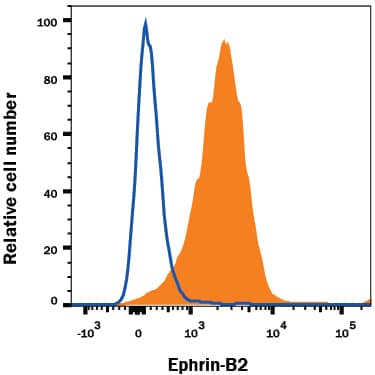Human Nephrin Antibody Summary
Gln23-Thr1029
Accession # O60500
Customers also Viewed
Applications
Please Note: Optimal dilutions should be determined by each laboratory for each application. General Protocols are available in the Technical Information section on our website.
Scientific Data
 View Larger
View Larger
Nephrin in Human Kidney. Nephrin was detected in immersion fixed paraffin-embedded sections of human kidney using Rabbit Anti-Human Nephrin Monoclonal Antibody (Catalog # MAB42693) at 3 µg/mL for 1 hour at room temperature followed by incubation with the Anti-Rabbit IgG VisUCyte™ HRP Polymer Antibody (VC003). Before incubation with the primary antibody, tissue was subjected to heat-induced epitope retrieval using Antigen Retrieval Reagent-Basic (CTS013). Tissue was stained using DAB (brown) and counterstained with hematoxylin (blue). Specific staining was localized to glomeruli. Staining was performed using our protocol for IHC Staining with VisUCyte HRP Polymer Detection Reagents.
Preparation and Storage
- 12 months from date of receipt, -20 to -70 °C as supplied.
- 1 month, 2 to 8 °C under sterile conditions after reconstitution.
- 6 months, -20 to -70 °C under sterile conditions after reconstitution.
Background: Nephrin
Nephrin is a 180 kDa type I transmembrane glycoprotein that belongs to the immunoglobulin superfamily (1). Mature human Nephrin consists of a 1033 amino acid (aa) extracellular domain (ECD) with eight Ig-like C2-set domains and one fibronectin type III domain, a 21 aa transmembrane segment, and a 165 aa cytoplasmic tail (2, 16). Within the ECD, human Nephrin shares 83% aa sequence identity with both mouse and rat Nephrin (3). Usage of the alternate exon 1B results in a distinct N-terminal sequence that lacks a clearly defined signal peptide cleavage site (4). Nephrin is expressed primarily on podocytes in the renal glomerulus and to a lesser extent in the brain and pancreas (3, 5). The 1B isoform is not expressed in the kidney (4). Nephrin localizes to intercellular junctions between podocyte foot processes where it functions as a homophilic adhesion molecule (2, 6). Nephrin is required for formation and maintenance of the slit diaphragm between these processes (7). It associates with Neph1, podicin, P-cadherin, and multiple scaffolding proteins which couple it to the actin cytoskeleton (8-12). Nephrin expression is required for the anti-apoptotic effect of VEGF on podocytes as well as for the ability of podocytes to up-regulate Glut1 and Glut4 glucose transporters in response to insulin (13, 14). Nephrin down-regulation contributes to diabetic nephropathy, and nephrin mutations underlie the lethal congenital nephritic syndrome NPHS1 (5, 15).
- Ruotsalainen, V. et al. 1999, Proc. Natl. Acad. Sci. USA 96: 7962.
- Holzman, L.B. et al. 1999, Kidney Int. 56:1481.
- Putaala, H. et al. 2000, J. Am. Soc. Nephrol. 11:991.
- Beltcheva, O. et al. 2003, J. Am. Soc. Nephrol. 14:352.
- Putaala, H. et al. 2001, Hum. Mol. Genet. 10:1.
- Khoshnoodi, J. et al. 2003, Am. J. Pathol. 163:2337.
- Ruotsalainen, V. et al. 2000, Am. J. Pathol. 157:1905.
- Barletta, G.M. et al. 2003, J. Biol. Chem. 278:19266.
- Huber, T.B. et al. 2001, J. Biol. Chem. 276:41543.
- Lehtonen, S. et al. 2004, Am. J. Pathol. 165:923.
- Lehtonen, S. et al. 2005, Proc. Natl. Acad. Sci. 102:9814.
- Verma, R. et al. 2006, J. Clin. Invest. 116:1346.
- Foster, R.R. et al. 2005, Am. J. Physiol. Renal Physiol. 288:F48.
- Coward, R.J. et al. 2007, Diabetes 56:1127.
- Cooper, M.E. et al. 2002, Semin. Nephrol. 22:393.
- Kestila¨, M. et al. 1998, Mol. Cell. 1:575.
Product Datasheets
FAQs
No product specific FAQs exist for this product, however you may
View all Antibody FAQsIsotype Controls
Reconstitution Buffers
Secondary Antibodies
Reviews for Human Nephrin Antibody
There are currently no reviews for this product. Be the first to review Human Nephrin Antibody and earn rewards!
Have you used Human Nephrin Antibody?
Submit a review and receive an Amazon gift card.
$25/€18/£15/$25CAN/¥75 Yuan/¥2500 Yen for a review with an image
$10/€7/£6/$10 CAD/¥70 Yuan/¥1110 Yen for a review without an image














